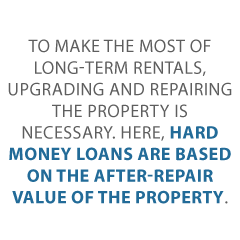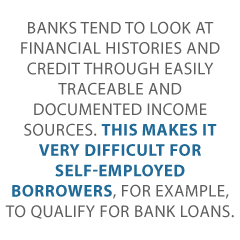
Why do Lenders Prefer Using a Personal Credit Score to Approve a Business Loan?
Your Personal Credit Score Can Make a Difference When You Apply for a Business Loan
If you’re a small business owner, don’t assume your business credit is separate from your personal. If you apply for a loan, lenders will consider it on your personal credit, not your business credit. Your business credit score is considered on its own only if your company generates millions in annual income. Otherwise, assume that your personal credit score will matter.
Solid personal credit is a necessity. The need to build and maintain it never goes away for most small company owners.
Some lenders (like banks) place more importance on personal scores. This is for checking business loan applications.
To establish your business’ creditworthiness, most lenders first analyze your personal credit score. This happens with organizations in operation for only a few years. It also happens with businesses seeking their first business loan.
So, small business owners must focus on creating a solid business credit profile. This is along with building a good personal credit score.
What is the Difference Between Business Credit Score and Personal Credit Score?
Here are the main variations between company personal credit scores:
- Business credit reports use Employer Identification Numbers (EINs). Personal credit reports use Social Security numbers (SSNs).
- The ranges of personal and business credit scores are very different. Business scores tend to vary from 0 to 100. The range of personal credit scores is 300 to 850.
- Experian manages both business and personal credit. They use separate databases and departments if you have both kinds of credit.
- You can freeze or lock personal credit reports. But business credit reports cannot be locked or go under security freeze.
- Different rules apply to data used in business and personal credit reports.
- Anyone can examine your business scores (they must buy the report and scores). But only you and others who have your authorization can access your personal scores.
When do Lenders Consider a Personal Credit Score for Approving Business Loans?
When reviewing creditworthiness for a business loan, most lenders check personal credit history.
But some lenders will give your personal credit score less weight than others. Lenders may pay less attention to a poor personal credit score if you already have a track record of solid business credit.
Your personal credit will matter more for a business loan when any (or all) of the following are true:
a. If You’re Seeking a Loan from a Bank or Other Conventional Lender
You should assume banks have strict lending rules and often aren’t too flexible. But private lenders offer financial help. It’s in the form of business loans with low credit requirements. They provide funds considering a business owners’ personal score. This is even if the business score is low. Here, conventional lenders may check personal credit scores to offer you a business loan with flexible terms.
b. If Your Business is a Startup or Small in Nature
If your business score does not have enough info for lenders to check credibility, they will place a higher value on personal scores.
This can be the case with sole proprietorships or small businesses with few employees. Here, it may be hard for a conventional lender to distinguish between your business credit report and personal credit reports.
c. Your Personal Credit Score is Relatively Low
Even if you have a few old negative entries on your personal credit report, getting a business loan shouldn’t be tough. If your business’s credit history is excellent, then it shouldn’t be a problem.
But too many negative items on your personal credit history may damage your score. A low personal credit score is something a lender will notice and consider as a risk.
Your personal credit score reflects how you manage your personal credit liabilities. But some may argue that your personal credit score has nothing to do with how your business operates its business credit liabilities.
As a business owner, understand how your credit score is calculated, and how it’s used when you apply for a credit. And understand what you should do to improve it.
How is a Personal Credit Score Calculated?
The Federal Government improved credit reporting quality with the Fair Credit Reporting Act in 1970.
The consumer credit bureaus collect information from a consumer’s credit profiles to create FICO scores. Experian, Transunion, and Equifax are the three largest credit bureaus. These three major credit bureaus maintain the same basic formula to rate your credit. A personal credit score ranges from 300 to 850 and is rarely identical.
They calculate your FICO score using this basic, widely used formula:
Payment History (35%)
Late payments, judgments, and bankruptcies are problematic. So are debt settlements, repossessions, charge-offs, and liens in your credit report. They will lower your personal credit score.
Debt Owed (30%)
Your personal credit score also depends on your debt-to-credit limit ratio. And it depends on the number of credit accounts, the total amount of credit balances, and the amount paid off on installment loans.
Credit History (15%)
Your credit history plays an integral part in building your credit score. The average age of the accounts and the length of your oldest credit account are the two most important criteria. The longer (or older) the file is, the better. This is because the score tries to forecast future creditworthiness based on past credit history.
Credit Types (10%)
Having different types of credit shows your ability to handle many credit accounts. These types include revolving, installment, and mortgage credit. It will definitely have a positive impact on your credit score.
New Credit Accounts (10%)
Each new “hard” inquiry on your credit report may have an adverse effect and may lower your score by 10%. Per Experian, these inquiries may stay on your report for a few years. But they will have no impact on your credit score after the initial year.
How Does This Information Build Your Credit Score?
Credit bureaus collect personal information like your name, date of birth, location, occupation, and more. They’ll also prepare a list of information that the creditors provide. Other information, like judgments or bankruptcy, will appear on your credit reports. It becomes part of your personal credit score. When you apply for new credit, your creditor will see all that info in your credit report and check your score.
If you find any inaccurate data reported, the credit bureaus have procedures in place to correct verifiable mistakes. Amendments to the Fair Credit Reporting Act in 1996 allow you to put a 100-word statement on any report that includes an item you dispute.
A range of factors can drive a bad credit score, including a divorce, severe illness, or loss of employment. This allows you to ensure that potential creditors are aware of the information.
Here’s what a potential creditor sees when they look at your score:
800-850 (Exceptional)
You should expect lenders to treat you like a king! With a credit score above 800, you can choose the best credit alternatives for your needs, and the best interest rates, from any lender you choose..
740-799 (Very Good)
If you have a credit score inside this range, lenders will treat you as a low-risk borrower. You can get a loan from almost any big lender with affordable rates. With this credit score, you can choose the best business loan that fits your business needs.
670-739 (Good)
This is a good score, and many people in the United States fall into this category. With this score, a borrower can hope to have more choices and approvals from various lenders.
580-669 (Fair)
This is a score that indicates a significant level of risk. A small business loan is feasible, but the interest rates will often be higher. If your score is in this range, you will have fewer possibilities than those with a higher level.
Most conventional lenders will not consider borrowers in this group for a small business loan. A personal credit score of 660 is the lowest that the SBA will typically consider.
300-579 (Very Poor)
Borrowers with this credit score can access some credit. But it’s considered a high-risk credit score. So there will likely be fewer possibilities and higher interest rates. If your score falls in this range and you want to get a business loan, consider offering some collateral.
How To Improve Your Personal Credit Score?
There is no simple solution to fix your personal credit score issues. But that doesn’t imply you can’t increase your score with time and effort. Here are six strategies to improve your personal credit score:
Analyze Your Score
You are entitled to get a free credit report once a year from annualcreditreport.com. You can get your credit report as many times as you want from all three major credit reporting agencies. These bureaus provide credit monitoring services for an affordable fee. Get your report from them and analyze it properly.
Make Good Use of Credit
This may sound oversimplified, but it’s critical. Resist the urge to use all your credit limits all the time. This is so even if you pay off the total outstanding debt balance every month through credit card debt consolidation. Using all the available credit further can damage your credit score.
Keep credit usage to roughly 15% of your available credit limit to increase your credit score.
Make Your Payments On Time
This is most likely the best and most successful strategy to improve your score. How fast you make payments and satisfy your liabilities makes up 35% of your score. A single late payment can significantly reduce your credit score.
Do Not Apply for Excess Credit
Applying for unnecessary credit reduces your credit score. So if you’re attempting to raise your score, it’s not a good idea.
Don’t Transfer Balances Too Often
Transferring balances from one credit card to another does not affect your credit score. But, it’s generally known as a wrong financial move that could harm your personal credit. Frequently transferring balances can put a bad impression on your future creditors.
Have Patience and Keep Trying
Improving your credit score requires strong determination and hard work. Your constant effort over six months or even a year can make a significant difference. But missing a payment or two will almost certainly lower your credit score fast.
About the Author:
Lyle Solomon has considerable litigation experience. He has substantial hands-on knowledge and expertise in legal analysis and writing. Since 2003, he has been a member of the State Bar of California. In 1998, he graduated from the University of the Pacific’s McGeorge School of Law in Sacramento, California. He now serves as a principal attorney for the Oak View Law Group in California.
The post Why do Lenders Prefer Using a Personal Credit Score to Approve a Business Loan? appeared first on Credit Suite.
The post Why do Lenders Prefer Using a Personal Credit Score to Approve a Business Loan? appeared first on BUSINESS DEMO WEBSITES.
The post Why do Lenders Prefer Using a Personal Credit Score to Approve a Business Loan? appeared first on Buy It At A Bargain – Deals And Reviews.








